- Home
- Joseph Bruchac
Brothers of the Buffalo
Brothers of the Buffalo Read online
ON THE TRAIN
CAMP SUPPLY
POLISHING BOOTS
CHOOSING MOUNTS
OLD LANDRIEU
FIRST PATROL
THE WASHITA
PRACTICE
HORSE THIEVES
ONE GOOD SHOT
TRADE
INDIAN FIGHTING
RAIDERS
SHOWDOWN
LOOKING FOR PEACE
I WAS HUNGRY
UNEXPECTED NEWS
QUANAH'S SUN DANCE
RIDING WEST
NEWS
MEDICINE
ARMY SHALL FOLLOW
MEDICINE WATER'S WORST
DEATH SONG
HOOFPRINTS
ON THE CLIFF
CALLING OUT NAMES
THE FAT HITS THE FIRE
FORT MARION
NEW ARRIVALS
BIBLIOGRAPHY
ABOUT THE AUTHOR
Joseph Bruchac
BROTHERS
OF THE
BUFFALO
A Novel of the Red River War
© 2016 Joseph Bruchac
All rights reserved. No part of this book may be reproduced, stored in a retrieval system, or transmitted in any form or by any means, electronic, mechanical, photocopying, recording, or otherwise, without written
permission from the publisher.
Library of Congress Cataloging-in-Publication Data
Names: Bruchac, Joseph, 1942- author.
Title: Brothers of the buffalo : a novel of the Red River War / by Joseph
Bruchac.
Description: Golden, CO : Fulcrum Publishing, [2016] | Summary:
“In 1874, the U.S. Army sent troops to subdue and move the Native Americans of the southern plains to Indian reservations, and this chronicles the brief and brutal war that followed. Told from the viewpoint of two youths from opposite sides of the fight, this is a tale of conflict and unlikely friendship in the Wild West”-- Provided by publisher.
Subjects: LCSH: Red River War, 1874-1875--Juvenile fiction. | CYAC:
Red River War, 1874-1875--Fiction. | Cheyenne Indians--Fiction. | African Americans--Fiction. | Soldiers--Fiction. | Friendship--Fiction. | West (U.S.)--Fiction. | BISAC: JUVENILE FICTION / Historical / Military & Wars. | JUVENILE FICTION / Action & Adventure / General. | JUVENILE FICTION / Historical / United States / Civil War Period (1850-1877).
Classification: LCC PZ7.B82816 Br 2016 | DDC [Fic]--dc23
LC record available at http://lccn.loc.gov/2015039450
Printed in the United States
10 9 8 7 6 5 4 3 2 1
Fulcrum Publishing
4690 Table Mountain Drive, Suite 100
Golden, Colorado 80403
(800) 992-2908 • (303) 277-1623
www.fulcrumbooks.com
ALSO BY JOSEPH BRUCHAC
Dog People: Native Dog Stories
The Girl Who Married The Moon: Tales from
Native North America
Keepers of Life: Discovering Plants through
Native American Stories and Earth Activities for Children
Keepers of the Animals: Native American Stories
and Wildlife Activities for Children
Keepers of the Earth: Native American Stories
and Environmental Activities for Children
Keepers of the Night: Native American Stories
and Nocturnal Activities for Children
Long River
Native American Animal Stories
Native American Games and Stories
Native American Gardening: Stories, Projects,
and Recipes for Families
Native American Stories
Native Plant Stories
Our Stories Remember: American Indian History, Culture,
and Values through Storytelling
Rachel Carson: Preserving a Sense of Wonder
Roots of Survival: Native American Storytelling and the Sacred
AUTHOR’S NOTE
Many years and many people went into the writing of Brothers of the Buffalo. One of the first people I have to mention—and sincerely thank —is Lance Henson, Cheyenne poet, Dog Soldier, and loyal friend for more than three decades. It was Lance who first opened my eyes to much of the history in this tale and told me many of the stories that I retold in the book. For example, it was Lance who introduced me to the epic story of Sweet Medicine as we sat on his back porch in Calumet, Oklahoma. Wolf’s side of this story would never have been possible without Lance and other Cheyenne friends and elders over the years who were extremely generous in sharing their knowledge. Special thanks go out to Gordon Yellowman, teacher and contemporary Cheyenne peace chief, who reviewed this entire manuscript and offered invaluable assistance.
But I also have to reach farther back than that in terms of acknowledgments—back to the years 1966 to 1969, when I was a volunteer teacher in Ghana and found myself immersed in African culture, something that no amount of books or online research could ever match. Whatever understanding I have of the depth, power, and sophistication of the many cultures and oral traditions of West Africa began then. The African proverbs interspersed between chapters—which are my own translations from the Hausa language—came out of those years and the years that followed in which I’ve had continued contact with West Africa and African writers from across the continent. Chief among them is the late Chinua Achebe of Nigeria, who was one of the advisors for my PhD, and a true friend and mentor.
In a similar way, I need to thank my many African American friends and teachers—friends and teachers in every sense of those words, who’ve opened my eyes to so many aspects of American history of which far too few are aware.
In fact, my own awareness began before I went to Ghana, in the ’60s when, as an eager—but very ignorant—young man, I was blessed to be a tiny part of the Civil Rights Movement, and marched in Mississippi alongside Martin Luther King, Dick Gregory, Stokely Carmichael, Jesse Jackson, and so many other incredible, dedicated visionaries.
In the years since then, my understanding of the complexity of African American history in the nineteenth century—the period of this novel— has only deepened thanks to the help of more people than I can mention in this brief space. So, let me just list a few authors, whose books should be in every school library: Julius Lester, whose To Be A Slave is a classic; Patricia McKissack, author of Christmas in the Big House, Christmas in the Quarters; and Christopher Paul Curtis, whose notable titles include Elijah of Buxton.
I’m no longer sure who first directed my attention to the accomplishments of the African American soldiers, many of them former slaves, who made up the 10th Cavalry when it was formed after the Civil War. It may have been Dick Gregory in a conversation I had with him years later, when he was invited to Skidmore College, where I taught courses in African and African American literature in the ’70s. Or the visionary novelist Ishmael Reed. Or maybe my very close friend Ron Welburn, whose life and writing span both the African American and the Native American worlds. What matters is that they, and the contemporary African American historians and reenactors who keep that legacy alive, are determined that the 10th should always be remembered and honored.
The incredible story of the men of the 10th Cavalry, and the important roles a large number of African Americans played in the “settling” of the American West are topics that should be taught in every school. It should be noted that the distinguished, truly heroic role the Buffalo Soldiers played in America’s wars did not end in the nineteenth century but continued on. Our history would have been far different without them. For example, during the Spanish-American War, when president-to-be Theodore Roosevelt made his famous charge up San Juan Hill in Cuba, his life wa
s saved by the 10th Cavalry.
In a strange sort of way, this book also owes its genesis to Jim Thorpe, the greatest athlete in American history. I’ve now written
two books about Jim: Jim Thorpe, Original All-American (Dial) and Jim Thorpe’s Bright Path (Lee & Low). I also co-wrote and produced with Tom Weidlinger a documentary film entitled Jim Thorpe: World’s Greatest Athlete that aired on PBS.
My research into Jim’s life led me not only to the Carlisle Indian School but to its well-meaning, but deeply opinionated founder, Richard Henry Pratt (1840–1924). The idea for the Indian boarding schools and residential schools in the United States and Canada came from Pratt’s experiment in “civilizing” the Fort Marion prisoners. Those schools impacted the lives of every Native American, often in tragic ways, for decades (in Canada, the residential schools did not end until 1992), and their effect is still being felt—and recovered from.
.
Wolf I am
Wolf I am
Wherever I search
in darkness
in light
Wherever I run
in darkness
in light
Wherever I stand
in darkness
in light
Everything will be good
for Maheo protects us
Wolf I am
Wolf I am
— Cheyenne song
The man with one eye
learns to thank God
when he meets a man
who is blind.
Bowing to one
who is shorter than you
does not prevent you
from standing straight again.
A man's faults
are like a hill.
When he stands on them
he sees only those
of other people
and talks about them.
It is not the eye
that understands
but the heart
and the mind.
— Hausa proverb
The land is lit by the full moon, us just passing into Kansas. Most people are asleep, but me, I’m still awake, feeling as if every mile that passes is taking me further into a freedom I never knew back East.
As I stare out the window of the train, I feel a prickling at the back of my neck. Mama told me that feeling may mean you’re being touched by an ancestor’s hand, that something powerful may be about to happen. Even if you can’t yet say what, or why.
The wide plain is almost bright as day, wide and free in a way it never is in Virginia. Then it changes. A dark mass just rises up out of nowhere and covers the land, like the earth itself has come alive. Takes my breath away. Then, though the engine is chugging noisier than a cotton gin, the rails clanking and clattering louder than a ton of chains, I hear a new sound. Thunder. A thunder that never seems to end, but just keeps rumbling and rolling.
And suddenly I know what it is. It is the hooves of thousands of buffalo. Animals I have never seen before save in pictures.
I hear excited voices shouting. Everyone else on the train is waking up now. From us negro recruits to the finer folks in the higher class cars farther back, away from the smoke of the engine, folks are wide-eyed and staring out at that moonlit herd. Men leaning out their windows, pointing, mouths open. They are yelling at the top of their lungs, but their human voices can barely be heard over that drumbeat of about as many hooves as there are stars in the sky. The great herd floods right up to the tracks, flowing like a black river with no beginning nor end, running alongside the train but not crossing over the rails. That sound of their hooves pounding the prairie seems to come not from outside but from deep in my heart.
Then there is a popping sound. One of them buffalo goes down, suddenly limp as a hung man cut down from a tree limb. More popping sounds. More buffalo falling whilst others tumble over their bodies. I lean out my own window. Hot cinders and smoke stream past my face as I see what I feared I’d see. Those popping sounds of rifles being fired are coming from the cars behind us. A dozen or more white folk all dressed up in suits, businessmen fresh out of the East, shooting through their open windows. The smell of blood is whipped in the wind—like when a lash cuts again and again into a man’s back.
Tears from the engine’s harsh smoke fill my eyes as they empty their guns into that mass of buffalo, reload, and keep firing. All of them laughing as they kill and kill for no reason at all other than to see those big black beasts fall.
I sit back down and close my eyes. Yeah, I’m finally in the West. But despite my dreams of finding a new life here where I can be a man, it seems most things are still the same.
The buffalo is our money.
It is our only resource with which
to buy what we need and do not
receive from the government.
The robes we can prepare and trade.
We love them just as
the white man loves his money.
Just as it makes a white man feel
to have his money stolen away,
so it makes us feel to see others
killing and stealing our buffaloes,
which are our cattle given to us
by the Great Father above
to provide us meat to eat
and means to get things to wear.
— Kicking Bird
Kiowa peace chief
1835–1874
GET ON THE TRAIN
St. Louis, Missouri
March 4, 1872
Dear Mother,
I hope all is well with you and Pegatha. I am well. I have finished my training and I was told that I did well. Now I am about to go by train from St. Louis to my post. I have seen so much of this great country already. It is a fine thing to be a free man and a soldier. I think you would be proud of how fine I look in my uniform of the 10th Cavalry. I am in D Company.
I hope this letter is being read to you by either Pegatha or Preacher Williams. I hope that he will help you write a letter in reply to me. I am eager to hear from you and to know that you are doing well. You will soon receive some money from my pay.
Give my love to Pegatha and tell her that her brother expects her to do well and apply herself at the new school for colored children.
I send you my love and my good wishes.
Your devoted son,
Washington Vance
Even out here, Wash thought, looks like there’s still no safe place to be a colored man.
Standing with forty other new cavalrymen on the platform in St. Louis, he and the other black recruits for the 10th were being given a taste of what sort of respect they might expect where they were going.
`“Once you boys get on my train, you better mind your manners, assuming you ever learned any,” the middle-aged white conductor with the big belly said.
From his eastern accent and the way he limped, it seemed likely he’d fought on the side of the North—just like some of the black men he looked down on from the ladder he’d climbed to address them. But there was no sympathy in his sneering voice.
“Now you better make sure you do not move about at all. You hear me. You stay in your own car. Unless you want to get your thick woolly heads broke.”
As if we hadn’t all figured that out already, Wash thought.
It would have been impossible not to notice the looks he and the others had gotten as they neared the tracks. Despite the fact they wore US Army uniforms, the mean-looking white men had given them the sort of squint-eyed stares that showed they’d as soon shoot a colored man as spit on him. They’d glared at Wash like he was lower than the dirt caked on their boots.
A surprising number of them were former Confederates. It didn’t take much guesswork on anyone’s part to know that. Some of them were actually still wearing parts of their sessesh uniforms. That was part of the quick education Wash was getting about what life might be like on the far side of the mighty Mississippi River. It looked as if there would be no shortage of unreconstructe
d rebels, rough-edged men ready to make a new life in the West and bringing their animosity toward the entire negro race with them.
I would bet a dollar against a dime, he thought, that few of you rebs boys have ever read Shakespeare like my daddy and me. I wonder just how many of you can even write your own names.
Then, out of the corner of his eye, Wash noticed something.One of those Southern gentlemen, a skinny white man with a full-face beard who was eyeing him from the window of the car just behind the one they were boarding, appeared sort of familiar.
Now where have I seen him before?
The thought tugged at Wash so much that he just stood there as the train started to move.
“Don’t you be looking back at them, brother,” a voice with a thick Mississippi Delta sound to it said from above him. “You just be asking for more trouble than a man can load into a wagon. Get on the train.”
Wash tried to turn his gaze down at the ground, cussing himself for being so foolish.
Look a bad man in the eye, you asking to die.
But a bell had been rung in his head by something about that cadaverous white man. Maybe it was those eyes of his, as black and beady and full of death as a rattlesnake’s. Or the way he was holding the gold chain that hung across his vest, as if he was about to pull out a watch and check the time.
One foot on the step, his hand grasping the rail by the door, Wash was frozen. He couldn’t move, even as that skinny ex-rebel stood up and leaned even closer to the window and Wash saw that he had let go of the watch chain and now was reaching for the ivory-handled pistol in the holster hung across his chest.
A big brown hand wrapped itself around Wash’s arm and yanked him up off the platform and in through the door. A smiling, good-looking face that was as brown as fertile soil and about as round as a ball was thrust down in front of him.

 Peacemaker
Peacemaker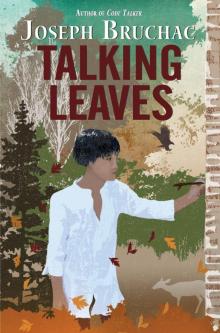 Talking Leaves
Talking Leaves Found
Found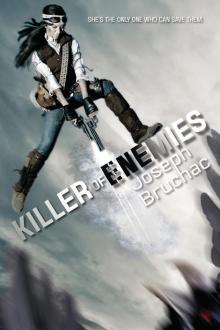 Killer of Enemies
Killer of Enemies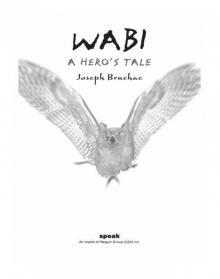 Wabi
Wabi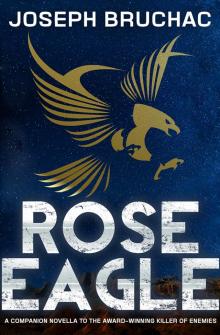 Rose Eagle
Rose Eagle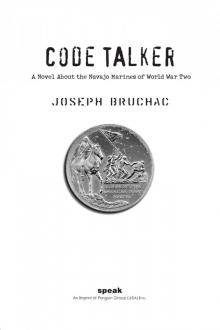 Code Talker
Code Talker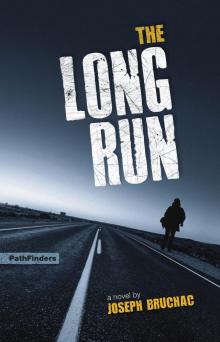 The Long Run
The Long Run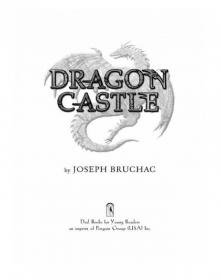 Dragon Castle
Dragon Castle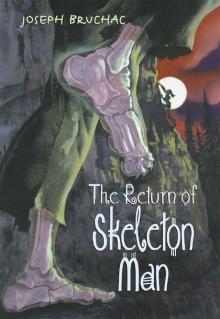 The Return of Skeleton Man
The Return of Skeleton Man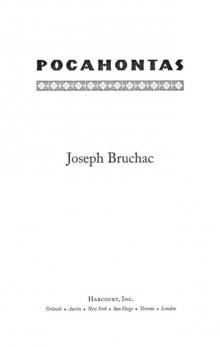 Pocahontas
Pocahontas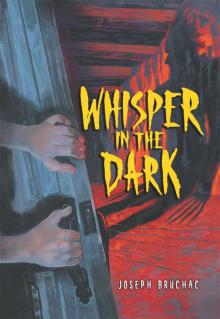 Whisper in the Dark
Whisper in the Dark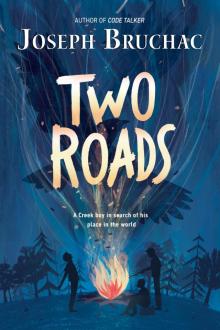 Two Roads
Two Roads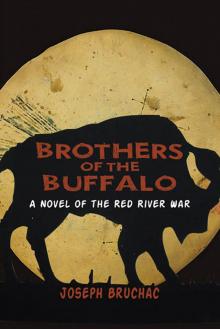 Brothers of the Buffalo
Brothers of the Buffalo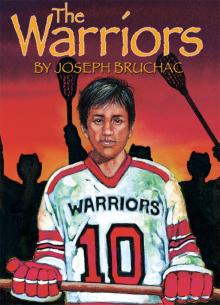 The Warriors
The Warriors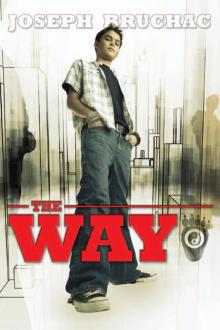 The Way
The Way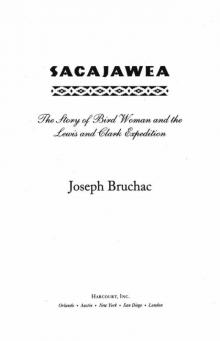 Sacajawea
Sacajawea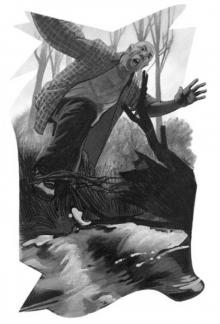 Night Wings
Night Wings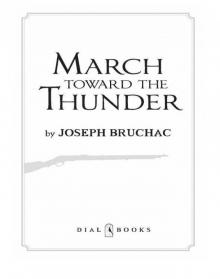 March Toward the Thunder
March Toward the Thunder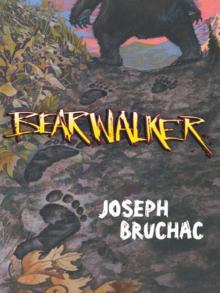 Bearwalker
Bearwalker Skeleton Man
Skeleton Man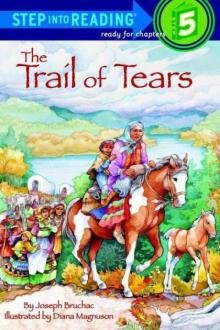 The Trail of Tears
The Trail of Tears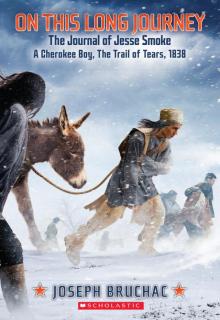 On This Long Journey
On This Long Journey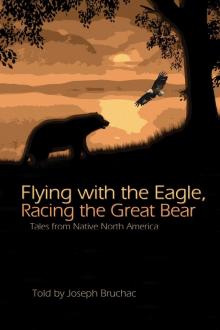 Flying with the Eagle, Racing the Great Bear
Flying with the Eagle, Racing the Great Bear